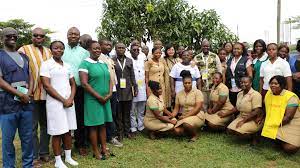Ghana Allocates $24.5M to GAVI to Support Vaccine Procurement, Says Health Minister

Ghana has made a decisive financial commitment to securing a consistent supply of vaccines by paying $24.5 million to GAVI, the global vaccine alliance, the Health Minister, Kwabena Mintah Akandoh, has announced. This payment reflects the government’s unwavering dedication to protecting the health and well-being of children across the country.
Speaking at the Government Accountability Series press briefing held at the Presidency in Accra, Minister Akandoh provided a mid-year update on the health sector’s progress. He underscored the government’s proactive measures to prioritize immunization efforts, emphasizing that this year’s vaccine budget was increased by an impressive 46 percent to meet growing public health needs.
“The government has demonstrated steadfast commitment to the health of our children. As of today, Ghana has fully paid the sum of $24.5 million owed to GAVI, which ensures the continuous availability of vital vaccines,” the Minister revealed. He explained that this timely payment would help prevent recurrent shortages of essential vaccines — shortages that could potentially lead to outbreaks of preventable diseases.
Minister Akandoh reassured Ghanaians that the efforts will translate into tangible health benefits soon, as the country is set to receive hundreds of thousands of vaccine doses by August. These vaccines are expected to be distributed across all regions, reaching every community, rural or urban, to strengthen the national immunization program.
“Investing in the health of our children today is securing Ghana’s tomorrow,” the Minister said passionately. He added that the government is far from complacent, pledging continued focus and investment in immunization initiatives. The ultimate goal is to protect every child and build a healthier nation capable of sustaining itself for generations to come.
In addition to securing vaccine supplies, the Minister also shed light on the government’s ambitious plans to develop Ghana into a hub for vaccine manufacturing within the region. This initiative aims to reduce dependency on external sources and enhance local production capabilities.
To realize this vision, the National Vaccine Institute is collaborating closely with the Food and Drugs Authority (FDA) and key pharmaceutical industry players. Together, they are working on strategies to establish a robust and sustainable vaccine manufacturing sector in Ghana.
Highlighting progress in this area, Minister Akandoh announced a significant milestone: one of Ghana’s private sector partners has recently received market authorization from the FDA to commercially produce Snake Anti-Venom Serum. This achievement marks an important step toward transforming Ghana from a consumer of imported medical products to a producer capable of meeting domestic and regional health needs.
This development aligns with the government’s broader strategy to enhance healthcare infrastructure and reduce costs associated with importing essential medicines and vaccines. Building local capacity not only strengthens health security but also creates economic opportunities and fosters innovation in the pharmaceutical sector.
Minister Akandoh’s update reinforces Ghana’s commitment to achieving better health outcomes through comprehensive vaccination coverage and local pharmaceutical development. The government’s proactive approach addresses both immediate immunization needs and the long-term goal of self-sufficiency in healthcare products.
As Ghana continues to navigate public health challenges, these efforts demonstrate a clear prioritization of preventive healthcare measures. The government’s investments today in vaccine procurement and production capacity are critical steps toward a future where Ghana can reliably protect its population against infectious diseases while stimulating local industry growth.
In conclusion, the payment of $24.5 million to GAVI and the push toward vaccine manufacturing represent significant milestones in Ghana’s health sector development. These initiatives are expected to improve vaccine availability, strengthen national health security, and support sustainable economic growth within the healthcare sector. Ghana’s health leadership remains focused on building a healthier, more resilient nation through strategic investments and partnerships.







